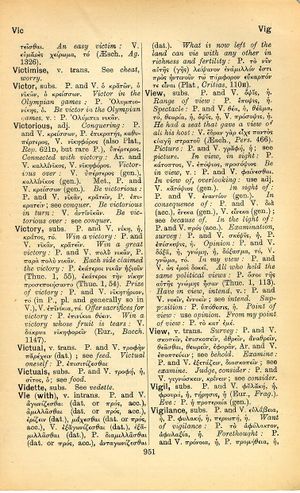vigil: Difference between revisions
Τιμώμενοι γὰρ πάντες ἥδονται βροτοί → Omnes enim homines honorari expetunt → Denn alle Menschen sehen sich recht gern geehrt
m (Text replacement - "<b class="b2">Frag.</b>" to "''Frag.''") |
(6_17) |
||
| Line 5: | Line 5: | ||
<b class="b2">Eve</b>: P. ἡ προτεραία (gen.). | <b class="b2">Eve</b>: P. ἡ προτεραία (gen.). | ||
}} | |||
{{Lewis | |||
|lshtext=<b>vĭgil</b>: ĭlis (<br /><b>I</b> gen. plur. [[vigilium]], Liv. 10, 33, 6), adj. [[vigeo]], [[awake]], on the [[watch]], [[alert]] ([[class]].; cf.: [[insomnis]], [[exsomnis]]).<br /><b>I</b> Lit.<br /> <b>A</b> Adj.: [[prius]] orto Sole [[vigil]] calamum et chartas et scrinia [[posco]], Hor. Ep. 2, 1, 113; 1, 2, 37: vigilum canum [[excubiae]], id. C. 3, 16, 2: [[ales]], i. e. the [[cock]], Ov. M. 11, 597: [[Aurora]], id. ib. 2, 112: [[custodia]], id. ib. 12, 148 et saep.—Transf., of things, [[wakeful]], [[watchful]], etc.: oculi, Verg. A. 4, 182: [[ignis]], i. e. [[always]] [[burning]], id. ib. 4, 200: lucernae, [[night]]-lamps, Hor. C. 3, 8, 14: auri vigili bibere, [[wakeful]], listening, Stat. Achill. 2, 119: nox, Tac. A. 4, 48.—<br /> <b>B</b> Subst.: vĭgil, ĭlis, m., a [[watchman]], [[sentinel]]: [[clamor]] a vigilibus fanique custodibus tollitur, Cic. Verr. 2, 4, 43, § 94; Liv. 44, 33, 8; Ov. M. 13, 370: nocturni, Plaut. Am. 1, 1, 195.— Of [[such]] vigiles [[there]] were in [[Rome]], from the [[time]] of [[Augustus]], [[seven]] divisions, [[with]] [[their]] prefects and sub-prefects, constituting a [[regularly]] organized [[night]]-[[police]], Suet. Aug. 30; Dig. 1, 15, 3; 47, 2, 56.—Transf., a [[sentinel]]: mundi (sol et [[luna]]), Lucr. 5, 1436 (1434).—Of cocks: nocturni, Plin. 10, 21, 24, § 46.—<br /><b>II</b> Trop.: [[cura]], [[wakeful]], [[active]], Ov. M. 3, 396; 15, 65: [[questus]], uttered by [[night]], Stat. S. 1, 2, 196. | |||
}} | }} | ||
Revision as of 09:10, 13 August 2017
English > Greek (Woodhouse)
subs.
P. and V. φυλακή, ἡ, φρουρά, ἡ, τήρησις, ἡ (Eur., Frag.).
Eve: P. ἡ προτεραία (gen.).
Latin > English (Lewis & Short)
vĭgil: ĭlis (
I gen. plur. vigilium, Liv. 10, 33, 6), adj. vigeo, awake, on the watch, alert (class.; cf.: insomnis, exsomnis).
I Lit.
A Adj.: prius orto Sole vigil calamum et chartas et scrinia posco, Hor. Ep. 2, 1, 113; 1, 2, 37: vigilum canum excubiae, id. C. 3, 16, 2: ales, i. e. the cock, Ov. M. 11, 597: Aurora, id. ib. 2, 112: custodia, id. ib. 12, 148 et saep.—Transf., of things, wakeful, watchful, etc.: oculi, Verg. A. 4, 182: ignis, i. e. always burning, id. ib. 4, 200: lucernae, night-lamps, Hor. C. 3, 8, 14: auri vigili bibere, wakeful, listening, Stat. Achill. 2, 119: nox, Tac. A. 4, 48.—
B Subst.: vĭgil, ĭlis, m., a watchman, sentinel: clamor a vigilibus fanique custodibus tollitur, Cic. Verr. 2, 4, 43, § 94; Liv. 44, 33, 8; Ov. M. 13, 370: nocturni, Plaut. Am. 1, 1, 195.— Of such vigiles there were in Rome, from the time of Augustus, seven divisions, with their prefects and sub-prefects, constituting a regularly organized night-police, Suet. Aug. 30; Dig. 1, 15, 3; 47, 2, 56.—Transf., a sentinel: mundi (sol et luna), Lucr. 5, 1436 (1434).—Of cocks: nocturni, Plin. 10, 21, 24, § 46.—
II Trop.: cura, wakeful, active, Ov. M. 3, 396; 15, 65: questus, uttered by night, Stat. S. 1, 2, 196.

